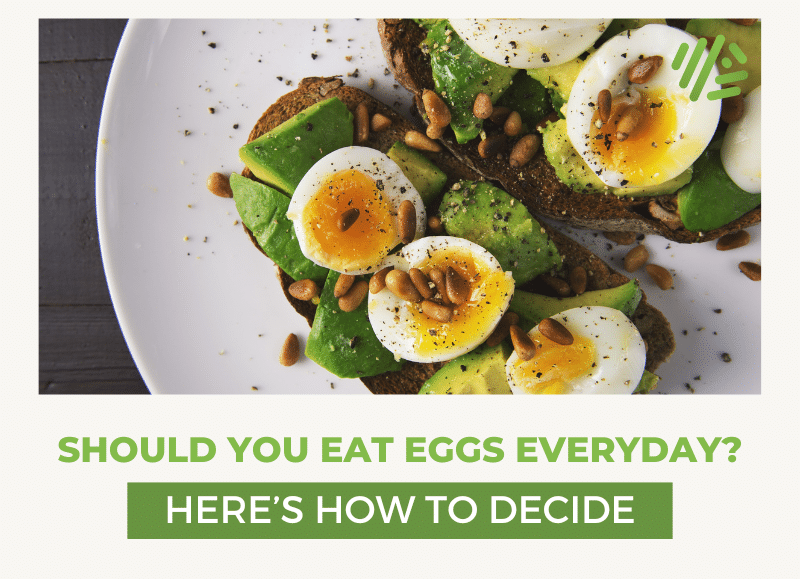Should You Eat Eggs Everyday? Here’s How to Decide
Genes Mentioned

Contents
I just finished a delicious breakfast of three scrambled pastured eggs cooked in ghee, half an avocado, and some roasted brussel sprouts.
Yum.
Prior to breakfast, I went for a run and listened to Joe Rogan interview Chris Kresser on his podcast. I am fans of both of these guys, but in my view, a snippet of their conversation about the health implications of eating eggs and cholesterol lacked nuance, so I decided to write this blog to get a few things off my chest.
Do eggs have too much cholesterol?
One egg has 187 mg of cholesterol or about twice the cholesterol in a 6 oz. piece of Atlantic salmon.
Is this too much?
Not for most of us.
We’ve touched on it here before, but it bears repeating: in many people, consumption of dietary cholesterol does not equal elevated levels of cholesterol in the blood. Most people don’t absorb a ton of the cholesterol they eat, although we all absorb some.
To the extent people do absorb dietary cholesterol, they tend to make less of it. In this way, the body keeps cholesterol levels tightly regulated. 1 2 This is what experts talk about when they discuss the “new thinking on dietary cholesterol.” This study from the American Journal of Clinical Nutrition is illustrative. The researchers found no change in blood lipid markers, like LDL-C, when eggs were eaten regularly.
Cholesterol absorption varies
However, the thing no one in Paleo circles likes to talk about is that not everyone absorbs cholesterol at the same rate.
Some, known as hyper absorbers, take in considerably more cholesterol than do others, and for them the increased absorption does show up in their biomarkers, like total cholesterol and LDL-C.
This was acknowledged by Chris Masterjohn in our interview. When you start from a very low cholesterol diet, as you will if you are strictly plant based, eating almost any cholesterol will raise levels to some degree. This is part of the reason we still have such a heated cholesterol debate – the plant based doctors want to see cholesterol at the lowest levels possible and when you eat some after eating none, levels rise.
However, when the consistent intake of cholesterol (and saturated fat that comes along for the ride) results in elevated LDL-C and LDL-P, this means increased risk for heart disease, and depending on how high levels get, all cause mortality as well. 3
One of the drivers of increased absorption of both cholesterol and plant sterol are the ABCG8 and ABCG5 genes, markers I have talked about in my posts on sterol sensitivity and absorption.
In the Joe Rogan episode, Joe and Chris refer to the emerging consensus about the difficulty of absorbing dietary cholesterol, but I believe they take the implications too far. Very little is said about the 20% who hyper-absorb.
Their reasoning is that since dietary cholesterol doesn’t raise serum levels of cholesterol, and because cholesterol was demonized in the first place as the result of a campaign by the sugar industry, there’s nothing to any of the “cholesterol is bad” talk, so everyone can eat unlimited amounts of dietary cholesterol.
This is bad advice.
Joe proudly tells the audience that he eats 4-6 eggs a day. Throughout the episode, Chris and Joe imply that anyone who doesn’t recognize that cholesterol is fine and healthy is a dummy, then they extend the same logic to saturated fat.
They claim that there is absolutely no reason to limit cholesterol in the diet, ever. Problem is, that is simply not true for about one in four people.
The personalized approach to cholesterol
Both sides want it to be so simple.
The Vegans tell you all you ever need is plants.
The Paleo types tell you all their animal products are perfectly safe all the time, so load up on bacon and eggs for breakfast seven days a week.
The truth lies somewhere in the middle, and it’s a sliding scale based on a number of factors, including the state of the microbiome, genetics and factors like uric acid, HbA1c and vegetable oil consumption, all of which oxidize LDL.
High fat diets can do bad things to some people.2 Where a diet is high in cholesterol, it’s also usually high in saturated fat, and high saturated fat diets are particularly dangerous for certain genotypes, such as APOE4 (which to his credit, Chris briefly touches on in the episode).
See also: The best diet for preventing Alzheimer’s disease
In addition to cholesterol, an egg has 1.6 grams of saturated fat, which is about 10% of daily value. In some people, eating saturated fat will have a big impact on their lipids as well.4 In fact, the saturated fat content of an egg may be the primary issue for some people, especially when you factor in cooking it in ghee and that no on eats just one egg…
But at the end of the day, Joe and Chris are basically saying that dietary cholesterol doesn’t raise serum cholesterol, so let’s load up on all the cholesterol we can get because the people on the other side don’t know a thing about nutrition, their point of view is 100% wrong, and has no merit whatsoever.
Is that likely?
No, it’s not.
Again, I admire Joe and Chris both, and I ate eggs for breakfast today, but I am not nearly so cocky about eggs and cholesterol, and not because I think some dietary cholesterol is necessarily a “bad thing.”
Cholesterol and saturated fat often co-exist
Aaron wrote a great post about how different genotypes process cholesterol and saturated fat differently, which is a must read for anyone looking for a nuanced perspective on this topic. In his post, he echoes some of what Joe and Chris have to say on the issue of cholesterol:
whilst a high level of blood-borne cholesterol is associated with an increased risk of heart disease, most people who suffer from heart disease have normal blood cholesterol levels. Secondly, as cholesterol is so fundamental to life it is directly synthesized in the body, mainly in the liver. Excess dietary cholesterol is mainly excreted, and any dietary cholesterol which is absorbed results in a decrease in cholesterol synthesis in the liver. Together this means that even a diet very high in cholesterol has little, if any, impact on the cholesterol levels in the blood which are maintained at a steady state.
This statement is true for a good number of people, but there is not a uniform reaction to dietary cholesterol (cholesterol rarely occurs in food without saturated fat alongside) and that needs to be recognized and mentioned when these discussions take place.
Very recent studies have shown the LDL-C increase in response to a high fat diet can range between 5-107%! There is tremendous variability between people in this regard.2
Back to eggs.
Eggs and the microbiome
Note: for a thorough breakdown of the science behind TMAO metabolism and how genetic factors play a role, Aaron’s recent post TMAO and heart disease: what we know (and what we don’t) is worth a read.
Now on to the way the bugs in our gut handle cholesterol.
Before you start eating 4-6 eggs a day, be aware of a study that appeared in the New England Journal of Medicine (“NEJM”) and a nasty little gut metabolite called trimethylamine-N-oxide, or “TMAO” for short.
The New England Journal of Medicine study found that our gut bacteria metabolize fats, like choline (which is found in abundance in eggs, meat, butter, etc.) into TMAO.
In the NEJM study, when subjects ate eggs while taking a course of antibiotics, TMAO wasn’t produced, but it was under normal circumstances, and guess what?
Elevated TMAO levels are a major predictor of heart disease
From the Cleveland Clinic Heart Lab:
A new blood test that measures levels of TMAO (trimethylamine-N-oxide) — a metabolite derived from gut bacteria — can powerfully predict future risk for heart attack, stroke, and death in patients who appear otherwise healthy, according to pioneering Cleveland Clinic research.
Ok, so people who are otherwise healthy can still be at risk for heart disease based on consumption of foods that are high in…cholesterol. It’s not necessarily the cholesterol that’s the problem, it’s what the gut does with the cholesterol. Or put another way – it’s what an unhealthy gut does with cholesterol, as eating fish seems to be protective of cardiovascular health although fish is one of the foods highest in TMAO. So, the nuance here is that those with certain unhealthy strains of bad bacteria in their colon will be at greater risk for heart disease when they eat a lot of fish and eggs, whereas someone with a different microbiome might not have as much of an issue.
I had my TMAO levels tested and they were normal, which is a step that should be taken by anyone on a high cholesterol diet as well.
TMAO, when elevated, is associated with a dangerous buildup of plaque in the artery wall, and it’s produced when some of us eat eggs.
To quote the study:
After adjustment for traditional risk factors and other baseline covariates, elevated plasma levels of TMAO remained a significant predictor of the risk of major adverse cardiovascular events.
Based on this NEJM study, you could be eating eggs everyday and thinking you’re fine because your cholesterol looks good (which would make sense because most don’t absorb the cholesterol they eat).
Those on a high cholesterol diet should be looking just as much at TMAO as they do at cholesterol levels. Serum cholesterol levels have zero to do with the way our microbiome uses cholesterol rich foods to create TMAO, hence the NEJM study expressly stating: “after adjustment for traditional risk factors…”
See also: 8 ways to rebuild gut health without probiotics
My take is this: if you eat foods that are rich in cholesterol, as I often do, know that you gain benefit from these foods, but that they can also cause problems for some when consumed in excess. The authors of the NEJM study do not recommend excluding choline from the diet, they recommend cycling intake so the body has the chance to excrete TMAO.
Again, quoting the NEJM:
Our data suggest that excessive consumption of dietary phosphatidylcholine and choline should be avoided; a vegetarian or high-fiber diet can reduce total choline intake. It should also be noted that choline is a semiessential nutrient and should not be completely eliminated from the diet, since this can result in a deficiency state. However, standard dietary recommendations, if adopted, will limit the intake of phosphatidylcholine- and choline-rich foods, since these foods are also typically high in fat and cholesterol content.
Key Takeaways – are eggs safe?
Yes, eggs are safe to eat.
The “dangers of eggs” chatter is way overblown for most people.
However, a subset of people that absorb large amounts of the cholesterol they eat, or who have an unhealthy microbiome, may be at greater risk when eating eggs.




Interesting. Not one word about fish in this article – even though 1) Fish has more TMAO than red meat or eggs and 2) the people who eat the most fish have the LEAST heart disease.
Darren,
Thanks for the comment. I just added a bit about fish and Chris Masterjohn, a recent podcast guest, also has weighed in on this issue. Those links to Chris’ site appear dead so I am linking to Chris Kresser citing his work: https://chriskresser.com/red-meat-and-tmao-its-the-gut-not-the-meat/
get to know my local farmers? i live in a third world desert
damn
Good read. the truth indeed lies somewhere in the midddle. Low-fat protein w/plants/vegetables.
Hi John. I just found your blog a few months back by searching for Lp(a) and any optimistic articles on how to lower it. My husband was tested at 60mg/dl so we are reading like crazy on how to manage this. I can’t tell you enough how much these articles resonate with me. For years, I have had excellent cholesterol readings eating a high-fat, lower carb diet, but my husband is clearly suffering from it. Reading your posts makes me feel alot less crazy!! I think he is absolutely a hyper-absorber – need to look at his 23andme for sure. Thank you again. This has been a huge help.
Thanks for the comment Christina and for reading! It’s a lot of work making sense of all this stuff, I agree it can be calming to realize that no two people will react in exactly the same way to any diet or type of food.
What about eating only the egg white and completely eliminating the yolks?
This is essentially the Dean Ornish strategy, but the vegetable oil issue / problem still remains.
Hi John
Thanks for the heads up
on eggs. I’m 52 yrs old and have struggled with digestive issues as long as I can remember. I’m on a FODMAP diet and have trouble digesting carbs. My diet now is pretty simple: 3 eggs in morning (2 whites only) natural oils, plantains, some oatmeal. I eat salads, chicken and fish. Veggies. That’s about it. Your info about eggs caught my attention. I have a long line of either cancer or heart disease on both sides of my family. Any ideas about what the heck I should eat? Thanks.
Todd
Whole food plant based diet is the only diet to scientistifcally prooved to reverse heart disease… The only one… Check it for your self
http://www.jarrow.com/articles/3/Carnitine,_the_Culprit_in_Red_Meat_and_the_Heart?__Think_Again.
An interesting take on the subject.
Jarrow sells multiple supplements that have carnitine.
Have you read Chris Kresser and Chris Masterjohn’s take on this issue?
https://chriskresser.com/choline-and-tmao-eggs-still-dont-cause-heart-disease/
What are your thoughts on his take?
Hey Nate, yeah, I have read Chris’ blog. He doesn’t dispute that TMAO is linked to heart disease, and he concedes that the NEJM study found a temporary increase in TMAO after eating eggs. I find the total TMAO vs. labeled TMAO discussion convoluted at best and tend to side with the NEJM over Chris, despite the fact that I respect what he does and the audience he’s built. His “46 other foods” study doesn’t focus on TMAO alone, it’s TMAO plus trimethylamine. My blog isn’t meant as an anti-cholesterol piece, it’s meant to offer another voice to a conversation that left no room for nuance. Joe and Chris say that eating all the dietary cholesterol you want is fine and healthy. I disagree based on the NEJM study and my own personal experience. No one has a definitive answer as of yet.
So I guess the part that is more convincing for me on the issue is the inverse correlation between egg consumption and heart disease in the multiple studies Chris Kresser cited. It seems like the actual mechanism behind TMAO and it’s relationship to heart disease is not fully understood, but I may be wrong.
Also I do know that food studies can be difficult to interpret sometimes, but I like eating eggs and tend to eat closer to the amount Joe Rogan does, so maybe I just want Chris to be right, haha.
Nate, check out Aaron’s post on TMAO: https://www.mygenefood.com/tmao-heart-disease-know-dont/
His research shows preliminary indicators that uptick in a particular gene’s expression may cause an elevation in TMAO. Dioxin may also play a role.
I think that Chris Kressler 2013 article (posted above) needs to be updated. It is now 4 years later and many studies have been done on TMAO and heart disease, as well as many other diseases. His silence on the issue is telling, since I’m sure he does not want to stop eating eggs or lose his followers because he needs to recommend lowering TMAO levels with a plant based diet. Sure, there are foods such as olive oil and balsamic vinger/wine that have DMS or other agents to reduce TMAO and the damage to the arteries. Why not skip the band aid step and address the source, the gut bacteria, and eliminate it with a plant based diet? It is better for our health, the animals and the environment. I have done quite a bit of research on this issue and I am perplexed at why it has not been given much media attention.